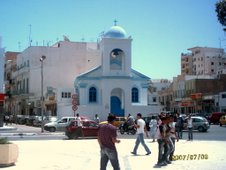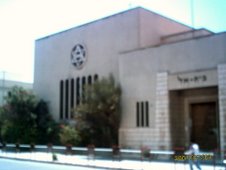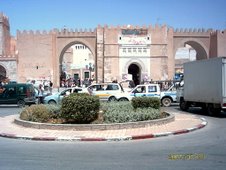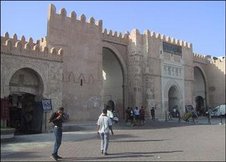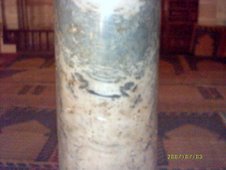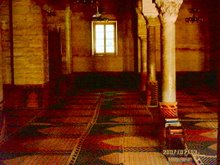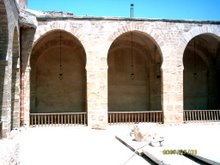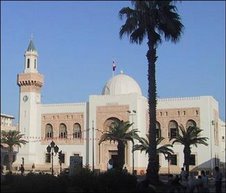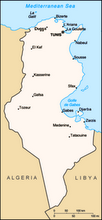Tunisian Couscous Products
Tunisian couscous manufacturing:
The couscous granules are made from semolina (coarsely ground durum wheat) or, in some regions, from coarsely ground barley or pearl millet. The semolina is sprinkled with water and rolled with the hands to form small pellets, sprinkled with dry flour to keep the pellets separate, and then sieved. The pellets which are too small to be finished grains of couscous fall through the sieve to be again sprinkled with dry semolina and rolled into pellets. This process continues until all the semolina has been formed into tiny grains of couscous. Sometimes salt is added to the semolina and water.
This process is very labour intensive. Traditionally, groups of women would come together and make a large batch of couscous grains over several days. These would then be dried in the sun and used for several months. Couscous was traditionally made from the hard part of the hard wheat Triticum durum, the part of the grain that resisted the grinding of the relatively primitive millstone. In modern times, couscous production is largely mechanized, and is sold in markets around the world.
The word Couscous:
The name is derived from Maghrebi Arabic kuskusu or ksaksu, which is from Tamazight seksu (meaning well rolled, well formed, rounded).The other variant, keskesu is mainly used by the Tuareg .In Tunisia it is commonly called "kusksi," though "kisksu" is also used.
Tunisian Couscous History:
One of the first written references is from an anonymous 13th century Hispano-Muslim cookery book, " : The book of cooking in the Maghreb and Al Andalus, with a recipe for couscous that was 'known all over the world'. From the name, it appears that this dish was not Arabic, but Berber. Couscous was known to the Nasrid royalty in Granada as well. And in the 13th century a Syrian historian from Aleppo includes four references for couscous. These early mentions show that couscous spread rapidly, but that in the main, couscous was common from Tripolitania to the west, while from Cyrenaica to the east the main cuisine was Egyptian, with couscous as an occasional dish. Today, in Egypt and the Middle East, couscous is known, but in Tunisia couscous is a staple. One of the earliest references to couscous in Northern Europe is in Brittany, in a letter dated Jan. 12 1699. But it made a much earlier appearance in Provence, where the traveler Jean Jacques Bouchard writes of eating it in Toulon in 1630. Couscous entered Tunisia sometime in the twelfth century, by virtue of the monumental studies of Zirid (972-1148) and Hafsid Tunisia (1228-1574) by historians Hady Roger Idris and Robert Brunschvig, who found no references to couscous in twelfth-century Zirid Tunisia and many references by thirteenth-century Hafsid times. The great Arab writer al-Muqaddasi (writing circa 985-990) never mentions couscous, although he is noted for writing about the foods he encountered. But couscous is mentioned in connection with many saints of Hafsid times including Ibn Naji’s description of burkukis as a large-grained couscous with meat that is virtually identical with the maghribiyya mentioned in the recipe at kaskasu bi'l-lahm:Couscous with meat. There is also an admiring description in the writings of Ibn Fadlallah of Tunisian pilgrims in Mecca in the fifteenth century who magically produced a plate of couscous, accompanied with melted butter, beef, and cabbage.
Tunisian Couscous Randa Brand Thin Couscous 1 KGThis process is very labour intensive. Traditionally, groups of women would come together and make a large batch of couscous grains over several days. These would then be dried in the sun and used for several months. Couscous was traditionally made from the hard part of the hard wheat Triticum durum, the part of the grain that resisted the grinding of the relatively primitive millstone. In modern times, couscous production is largely mechanized, and is sold in markets around the world.
The word Couscous:
The name is derived from Maghrebi Arabic kuskusu or ksaksu, which is from Tamazight seksu (meaning well rolled, well formed, rounded).The other variant, keskesu is mainly used by the Tuareg .In Tunisia it is commonly called "kusksi," though "kisksu" is also used.
Tunisian Couscous History:
One of the first written references is from an anonymous 13th century Hispano-Muslim cookery book, " : The book of cooking in the Maghreb and Al Andalus, with a recipe for couscous that was 'known all over the world'. From the name, it appears that this dish was not Arabic, but Berber. Couscous was known to the Nasrid royalty in Granada as well. And in the 13th century a Syrian historian from Aleppo includes four references for couscous. These early mentions show that couscous spread rapidly, but that in the main, couscous was common from Tripolitania to the west, while from Cyrenaica to the east the main cuisine was Egyptian, with couscous as an occasional dish. Today, in Egypt and the Middle East, couscous is known, but in Tunisia couscous is a staple. One of the earliest references to couscous in Northern Europe is in Brittany, in a letter dated Jan. 12 1699. But it made a much earlier appearance in Provence, where the traveler Jean Jacques Bouchard writes of eating it in Toulon in 1630. Couscous entered Tunisia sometime in the twelfth century, by virtue of the monumental studies of Zirid (972-1148) and Hafsid Tunisia (1228-1574) by historians Hady Roger Idris and Robert Brunschvig, who found no references to couscous in twelfth-century Zirid Tunisia and many references by thirteenth-century Hafsid times. The great Arab writer al-Muqaddasi (writing circa 985-990) never mentions couscous, although he is noted for writing about the foods he encountered. But couscous is mentioned in connection with many saints of Hafsid times including Ibn Naji’s description of burkukis as a large-grained couscous with meat that is virtually identical with the maghribiyya mentioned in the recipe at kaskasu bi'l-lahm:Couscous with meat. There is also an admiring description in the writings of Ibn Fadlallah of Tunisian pilgrims in Mecca in the fifteenth century who magically produced a plate of couscous, accompanied with melted butter, beef, and cabbage.

1 KG plastic bag;Composition : pure semolina from durum wheat; Characteristic : Manufactured starting from pure durum wheat semolina;Bacteriological characteristics (per gram of couscous):Total bacteria:<105;toal>
Tunisian Couscous Randa Brand Medium Couscous 1 KG

1 KG plastic bag;Composition : pure semolina from durum wheat; Characteristic : Manufactured starting from pure durum wheat semolina;Bacteriological characteristics (per gram of couscous):Total bacteria:<105;toal>
Tunisian Couscous Randa Brand Heavy Couscous 1 KG

1 KG plastic bag;Composition : pure semolina from durum wheat; Characteristic : Manufactured starting from pure durum wheat semolina;Bacteriological characteristics (per gram of couscous):Total bacteria:<105;toal style="color: rgb(51, 51, 255);">
Tunisian Couscous Diari Brand Thin Couscous 1 KG

1 KG plastic bag;Composition : pure semolina from durum wheat; Characteristic : Manufactured starting from pure durum wheat semolina;Bacteriological characteristics (per gram of couscous):Total bacteria:<105;toal style="color: rgb(51, 51, 255);">
Tunisian Couscous Diari Brand Medium Couscous 1 KG

1 KG plastic bag;Composition : pure semolina from durum wheat; Characteristic : Manufactured starting from pure durum wheat semolina;Bacteriological characteristics (per gram of couscous):Total bacteria:<105;toal style="color: rgb(51, 51, 255);">
Tunisian Couscous Diari Brand Heavy Couscous 1 KG

1 KG plastic bag;Composition : pure semolina from durum wheat; Characteristic : Manufactured starting from pure durum wheat semolina;Bacteriological characteristics (per gram of couscous):Total bacteria:<105;toal style="color: rgb(51, 51, 255);">
Tunisian Couscoussier 4.5 KG Bulge

The couscoussier is a special kind of double boiler.Meat and vegetables are boiled in the lower half.The top half has holes in the bottom through which the steam rises to cook the grain which is put in this part. Cooked this way the grain acquires the flavor of whatever is below.This collection is equipped with double coppered bottom supporting the uniform distribution with heat on all the surface of the bottom and reducing the time of cooking from where an important economy of energy. This uniform distribution of heat avoids with the food to burn. The coppered articles are also equipped with removable handles , very practical for the arrangement, cookings with the furnaces and for cleaning in the lava - crockery. This collection is appreciated by its convenience and its simplicity.

The top half has holes in the bottomt(This is other kind of cousocussier:Complet Right )
Testimonials:
Françoise Marseille:Je connais la Tunisie et surtout le COUSCOUS,un jour un ami Tunisien m'a dit que le couscous est un don du ciel ,au Début j'ai pensée qu'il exagére un peu mais aprés que j'ai goûtée la premiere fois un plat de couscous avec viande J'AI PROFITER AU MAXIMUM.J'habite maintenant en californie et pour ma provision en couscous j'ai achetée un kilos de couscous randa , une couscousiere ,j'ai essayée la recette couscous avec viande et c'est le succès total. TRanslation:I know Tunisia, especially the COUSCOUS, one day a Tunisian friend says that the couscous is a gift of god,at the beginning I thought he exaggerate , but after my first couscous dish( with meat) I love it.I live know in California and for my provision in couscous I have bought: couscous randa brand, a couscoussier, I have tried couscous with meat recipe and it's awesome.
Omar Quebec:I'm a Tunisian,I work in Canada ,I miss Tunisian dishes ,your product is great ,Thanks.


